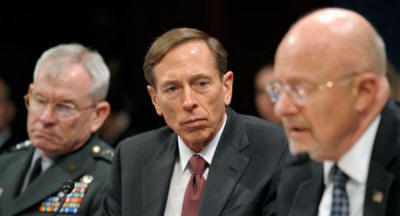1. Why resign now?
The Obama administration's first sex scandal exploded just three
days after the president was reelected at the end of a
hard-fought campaign and just days before Petraeus was scheduled
to appear at a congressional hearing about the attacks in
Benghazi.
The White House says no one there knew about the Petraeus
situation before Wednesday and the president himself was
informed Thursday.
But if the story had broken a week
earlier, those headlines would have overtaken much of the
president's message about the middle class and his work in the
aftermath of Hurricane Sandy.
Who made the decision to wait, and
why, is going to be the subject of scrutiny as this scandal
continues to unfold. Petraeus's departure now has also thrown a
whole new pile of grist into
the Benghazi controversy.
Already, the attack that killed
Ambassador Chris Stevens and three others was being called an
intelligence failure - both the failure to anticipate it and the
decision to identify it as a riot rather than a terrorist
attack.
Acting CIA Director Michael Morrell, Petraeus's deputy,
will go to the Hill instead for Thursday's hearing. B
ut already, there's a clear sense
that going public with his affair and resigning from his job
isn't enough to get Petraeus off the hook.
"David Petraeus testifying has
nothing to do with whether or not he's still the CIA
director, and I don't see how the CIA can say he's not going
to testify," House Homeland Security Committee Chairman
Peter King (R-N.Y.) told CNN.
"He was at the
center of this and he has answers that only he has."
2. What else was part of the FBI probe?
The FBI's toppling of the CIA director seems like the ultimate
in intelligence sibling rivalries. It didn't start that way.
The Washington Post reported Saturday that the FBI investigation
began because a woman close to Petraeus sought protection after
receiving several threatening emails from Broadwell.
After a deeper look at the general's
personal email account, there were initially questions about
whether it had been hacked.
But investigators soon concluded
from the content of the emails that they were evidence of an
affair between Petraeus and Broadwell. According to the Post,
weeks of probing culminated Tuesday, when Director of National
Intelligence James Clapper was told that compromising
material had been found.
Clapper subsequently told Petraeus
to resign.
A senior intelligence official denied reports that Clapper
ordered Petraeus to resign but acknowledged that Clapper pushed
the CIA director in that direction.
"Director Clapper urged Director Petraeus to step down. He was doing that as a friend, as a
colleague, as a fellow retired general officer and as an
admirer," said the senior official, who asked not to be
named.
"This was a
conversation between two friends and colleagues."
The official declined to discuss why
Clapper thought Petraeus should resign.
The Post report opens up other questions:
-
Who was the woman who
received the emails from Broadwell?
-
What was sent from
Petraeus's account?
-
Was there broader access to
his email, as indicated by other reports?
-
And beyond the emails
indicating an affair, was there any indication of
impropriety on Petraeus's part?
Especially in the wake of
the WikiLeaks scandal, the
military and intelligence agencies have been taking new measures
in shoring up security, which includes additional tracing and
logging to track things like information being moved to personal
email accounts.
A government official who asked not to be named told POLITICO
Friday that the probe that led to Petraeus's resignation arose
out of another investigation.
The official would not be more
specific.
3. Did he think the story was about to
leak?
Petraeus appears to have successfully kept the situation quiet
for months, if not longer.
He had known for all that time that
he was violating the moral and professional code that he cited
in his message to CIA employees Friday. And he knew for weeks
that the FBI was looking into the situation.
But something made him come forward now.
The larger circumstances of the election and next week's hearing
might be pure coincidences. Members of Congress were this week
informed of the situation, and that's a tried and tested way for
information, especially juicy information, to leak out. Add to
that their frustration at not being told until now, and the
possibilities increase exponentially.
The FBI had been asking questions, too. That created a dilemma
for a man whose professional rise has been intertwined with his
sterling personal standing: risk being hounded by a story
someone else defined, or step forward for the fall himself by
getting out ahead of it and trying to take control?
And those aren't the only options for who might have spoken up.
Both Petraeus and Broadwell are
married, with wide networks of friends and acquaintances who
might have discovered what was going on.
In a situation as tabloid-friendly
as this - high-profile government official with a reputation to
rival G.I. Joe's, intelligence tie-in, journalistic compromise -
it wouldn't have taken much to stoke the fires.
4. Why weren't Obama and the Hill
committees told earlier?
Members of Congress haven't said much beyond a few press
releases praising Petraeus that went out Friday afternoon. But
they're more than a little frustrated that they didn't learn
about the affair and the investigation until this week.
Still, the FBI has said this wasn't a criminal investigation
into Petraeus.
If Petraeus didn't do anything that
was actionable to dismiss him from the job, then members will
have to explain what they feel should have been reported.
Should they have been told there was
a possibility that the CIA director's email had been hacked, and
that he might be in a compromising situation?
"We were told they were not
going after Petraeus and they sort of came across it in some
unrelated fashion," said one congressional staffer, who
asked not to be named.
The staffer said intelligence
committee members would expect to know if the CIA director
himself were being probed, but that doesn't sound like what was
happening here - at least initially.
"If they were investigating Petraeus directly, of course, they would have to let the
committee know," the aide said. "It depends how they came
across it and when."
Steve Aftergood, who studies
intelligence issues for the Federation of American Scientists,
noted that by law, Congress is required to be informed about,
"significant
intelligence activities or failures, but significant is left
undefined and in the eye of the beholder."
"Beyond the letter of the law, there's a prudential
obligation to keep the committees ahead of the curve and,
evidently they don't feel that job was fulfilled in this
case," Aftergood said.
"There's also a
question of whether it's wise to inform more people about
the existence of the investigation when you're not sure
where it's headed. I'm not absolutely certain the FBI should
have gone to Congress earlier."
Aftergood noted that what the
situation might boil down to is that,
"anything
affecting the CIA director is of interest."
5. What role, if any, did Benghazi
play?
At another moment, perhaps the CIA director could have admitted
having an affair and survived.
But this isn't the best time for an intelligence community
scandal. The election is over and Mitt Romney failed to weigh
Obama down by claiming intelligence failures in the
attack on the consulate in Libya.
But the questions about what
happened there remain, and immediately colored Petraeus's
departure.
There seems to have been some lag time between when the CIA got
information about the attack and when that information was
circulated. That appears to have been what U.N. Ambassador
Susan Rice was drawing from in her statements the weekend
after the violence about the investigation still centering on a
riot rather than a planned attack.
Between that and other questions
about CIA performance before and after the four Americans were
killed, there was intense pressure on the agency even before the
director's sudden departure.
Some of the questions that will be asked about Petraeus now that
the affair is known will be about his conduct during this time.
But some of them will be about
whether the public relations aspect of this caused what a number
of people in the intelligence-community might see as a
disproportionate response in forcing a decorated general and
director of the agency out over cheating on his wife.
Obama was told about the situation Thursday but didn't accept
the resignation until Friday.
He may ultimately have concluded
that dealing with this on top of
the Benghazi mess would
have been too much.
6. Did Petraeus make the situation
worse?
"We all will make
mistakes," Broadwell wrote as No. 5 in her list of Petraeus's
"Rules
for Living" published on The Daily Beast Monday.
"The key is to
recognize them and admit them, to learn from them, and to
take off the rear-view mirrors - drive on and avoid making
them again."
Now the question is whether Petraeus
lived by that rule himself.
Bends and breaks of the truth are part of having an affair - to
avoid embarrassment, or getting caught.


